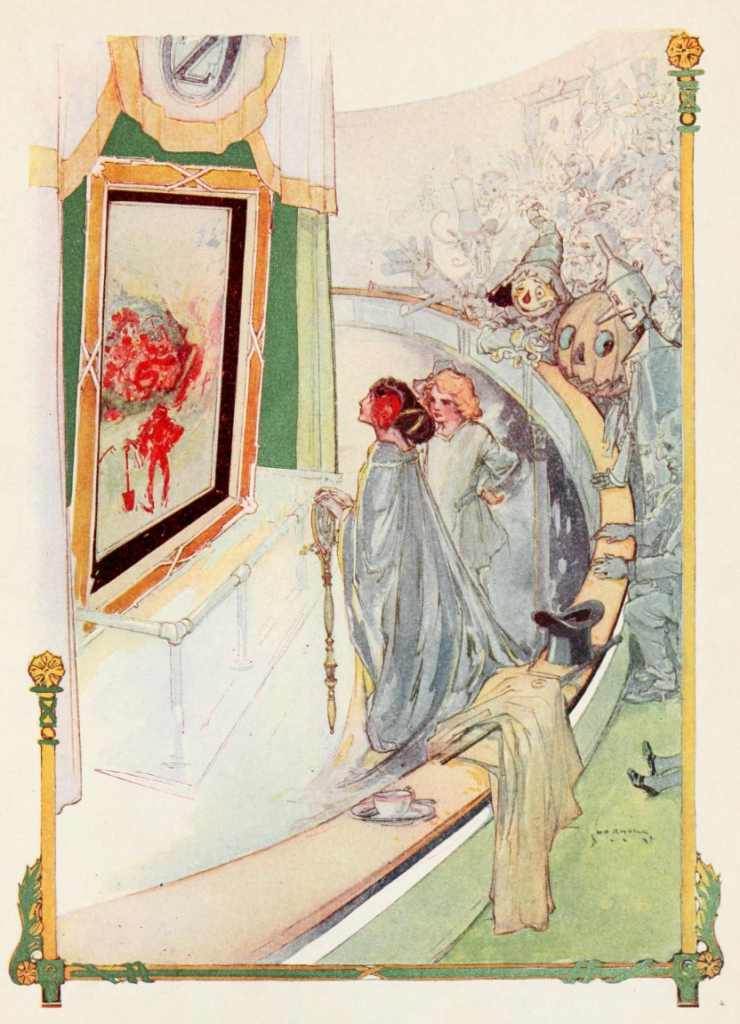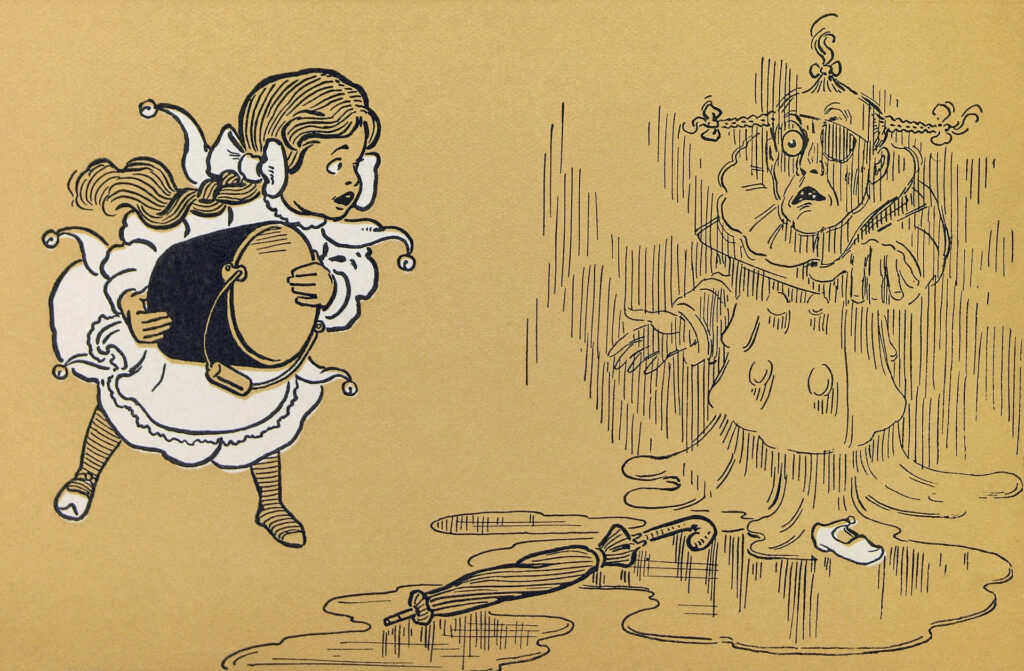
The alleged Oz utopia maintains a level of totalitarian control on par with Nineteen Eighty-Four, but with sanitized magical brain-restructuring instead of the torture Airstrip One and the Nome King favor. Here is how George Orwell describes the telescreens that make life hell in Airstrip One:
There was of course no way of knowing whether you were being watched at any given moment. How often, or on what system, the Thought Police plugged in on any individual wire was guesswork. It was even conceivable that they watched everybody all the time. But at any rate they could plug in your wire whenever they wanted to. You had to live—did live, from habit that became instinct—in the assumption that every sound you made was overheard, and, except in darkness, every movement scrutinized.
Writing of the Magic Picture in The Patchwork Girl, Baum seems to anticipate Orwell’s nightmare, with cultish adoration of Ozma in place of Big Brother:
“Ozma knows many things,” said the Shaggy Man.
[…] “Does she always watch the Magic Picture?” asked Ojo.
“Not always, for she has many things to do; but, as I said, she may be watching us this very minute. […] Everyone in Oz loves Ozma and hates her enemies, for she is as just as she is powerful.” (164–165)
Far from valuing individuality, the civilized Oz crushes potential threats to the status quo, arresting Ojo, for instance, though he just innocently picks a five-leaf clover. The society functions because the people, like the broken Winston at the end of Nineteen Eighty-Four, truly enjoy bondage, just not to bosses or overseers in their daily labor. They are “delighted to obey [Ozma’s] every command”(Emerald City 31–32, emphasis mine), to always obey. If the regulation of magic is a metaphor for technology, then the implications are dire.
The Oz of the original two novels, while unironically “marvelous,” is far from the otherworldly communist dictatorship utopia Ozma civilizes it into with these powers. In The Wonderful Wizard, two of the countries of Oz, Munchkin Country and Winkie Country, do not just practice slavery but have their whole populations under bondage to cruel tyrants, the Wicked Witch of the East and the Wicked Witch of the West, respectively. The nominal capital is under the authority of a dictator who has deposed Pastoria, the rightful ruler, and collaborated with Mombi to conceal that ruler’s heir. He uses illusions and lies to keep his subjects scared and in awe of him enough not to probe and discover his fraud.
Furthermore, the uncivilized Oz is full of vicious creatures such as the Kalidahs. There are other hostile groups such as the Hammer-Heads who attack travelers in the Country of the Quadlings. Animals are fully sapient people capable of speech and sophisticated thought, yet humans still hunt them for sport, as the Gump attests in The Marvelous Land. Though Baum uses them for comedy, the Emerald City has bizarre and cruel laws. The “greatest crime any person can commit” is “chopping leaves from the royal palm tree,” which is punished by seven death sentences followed with life imprisonment (Marvelous Land, 192–194). Omby Amby, the one-man army, without the Wizard’s terror behind him, is incompetent and insufficient to prevent an uprising of women who are unsatisfied with their lack of representation. Traveling the land is an easy way to die.
The moral principles of Oz that Baum establishes in The Emerald City hold that killing is always wrong, even in self-defense. “No one has the right to destroy any living creatures, however evil they may be, or to hurt them or make them unhappy” (268). But the “civilizing” of Oz that allows Ozma to make such statements hinges on the killing of destabilizing forces, in particular the Wicked Witches. Dorothy herself melts the Wicked Witch of the West. Though she tells the latter “I’m very sorry,” she feels no regret, nor should she, simply wiping her up like any of the messes the Witch forced her to clean during Dorothy’s period of enslavement (Wonderful Wizard 154–155). The deaths of both Witches are marked with celebration. Similarly, the heroes killing Kalidahs, slaughtering all of the attack animals of the Wicked Witch of the West, and slaying the giant spider of Quadling Country are unquestioned and only positive.

In this “civilizing” phase, Ozma and Glinda are not opposed to militarism and violence. On the contrary, they are as warlike and martial as the Nome King, invading his kingdom without provocation. Recall the large, effective army Glinda uses to defeat Jinjur. While doing so, Glinda threatens her enemies with death without objection from anyone but the Tin Woodman (Marvelous Land 267). The Tin Woodman himself slays hostile creatures in The Wonderful Wizard, butchering 40 wolves and a cat, and owes his later position of authority to his role in killing the Wicked Witch of the West.